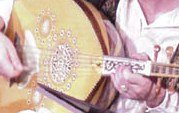Neva on a Sunday…
 OK, I’ll try to explain this the way Outiboy explained it to me. In Arabic music theory, the note G is called Nawa. Except Nawa denotes less a note, than an open string on the oud. And because the Ottoman Turks tuned the oud a whole step higher than the Arabs, the open string referred to as Nawa, when plucked on a Turkish tuned oud, would have produced not G, but A. And Nawa is pronounced Neva in Turkish.
OK, I’ll try to explain this the way Outiboy explained it to me. In Arabic music theory, the note G is called Nawa. Except Nawa denotes less a note, than an open string on the oud. And because the Ottoman Turks tuned the oud a whole step higher than the Arabs, the open string referred to as Nawa, when plucked on a Turkish tuned oud, would have produced not G, but A. And Nawa is pronounced Neva in Turkish.So in classical Turkish theory, Neva is the name for A. Now here is where it gets really whack. When the Ottoman Turks adopted Western musical notation, for some reason, they wrote everything a fourth higher than it really is. In other words, a song that is in the key of A is written as if it were in D. Thus, the Ottomans used a modified form of Western notation in which the notes on the staff refer not to their Western equivalents, but to a fourth lower. What we would recognize as D, they saw as A. It’s that simple.
So when Abadzi recorded Gazeli Neva Sabah, she sang in the key of D (actually D#) because it was often the key in which she sang αμανέδες. However, whoever was responsible for deciding on the label for the actual record made an error. He (or she) had most likely seen a musical score written in the key of A referred to as Neva in the title of the song. But remember, in Ottomanized Western notation, A written out looks like D. It’s not difficult to see how a Greek familiar with Western notation (but not Ottomanized Western notation) would mistake A for D (because, after all, it looks like D) and therefore assume (erroneously) that Neva refers to the key of D, because that’s what it would be if it were truly Western notation. But it’s not.












3 Comments:
i agree with castor i cant play anything but love music.
c.felipe-
try Rembetica: Historic Urban Folk Songs from Greece,
Greek-Oriental Rembetica, and Lost Homelands.
I love folk music.
Post a Comment
<< Home